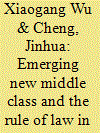| Srl | Item |
| 1 |
ID:
119237


|
|
|
| 2 |
ID:
186613


|
|
|
|
|
| Summary/Abstract |
This article examines the ethnic disparity in Chinese sentencing. It argues that the dominant "focal concerns perspective" cannot be fully applied in the Chinese context because of the social control imperative rooted in Chinese politics. Despite the potential for Chinese judges to hold stereotypical views of minorities that may lead to discrimination against them, the need for social control tends to lead judges to favor ethnic minorities to cajole them into obedience. Furthermore, ethnic influence is heterogeneous. Group threat theory posits that sizable groups tend to be treated more harshly to preserve the existing social structure. Albeit this article agrees that sizable focal minority groups are treated differently in China, contrary to that theory it argues that because of the country's Confucian and Marxist-Leninist-Stalinist heritages such groups actually enjoy greater leniency in sentences for non-separatist crimes such as theft. We retrieved data from the China Judgments Online website and compiled a dataset comprising 22,902 theft crime observations in China's five autonomous regions. Using linear regression models, we found that focal minorities indeed enjoy preferential sentencing treatment. The results of this study will not only help researchers to understand ethnic issues in China, but will also benefit the larger community by offering an example of the localization of a Western-rooted theory.
|
|
|
|
|
|
|
|
|
|
|
|
|
|
|
|
| 3 |
ID:
147621


|
|
|
|
|
| Summary/Abstract |
Due to the lack of effective institutional constraints, the negative externality from industrial production will lead to environmental pollution and spatial spillover on neighboring units. Because the self-purification capacity of the environmental system is limited, a strong time effect is witnessed. Time lag and spatial spillover need to be considered to mitigate the effect of industrial pollution. Using geographically weighted regression (GWR) and geographically and temporally weighted regression (GTWR), this paper decomposes the spatiotemporal heterogeneity of industrial pollution in China. Results show a significant spatio-temporality in the evolution of the provincial-level industrial pollution since 2007. As the major participants, state-owned enterprises play a leading role in the state economy and greatly affect pollutant emissions. In the central and eastern regions, an increasing proportion of state-owned output values is related to the decrease of industrial pollution emissions, whereas western regions witness an opposite trend. Emissions charge plays a positive role in curbing the emission from industrial enterprises in the central and western regions. A better understanding of the spatiotemporal heterogeneity of industrial pollution is the prerequisite in the alleviation of industrial pollutions to achieve a sustainable economic growth.
|
|
|
|
|
|
|
|
|
|
|
|
|
|
|
|